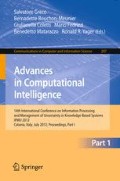Abstract
Usually, vehicle applications require the use of artificial intelligent techniques to implement control methods, due to noise provided by sensors or the impossibility of full knowledge about dynamics of the vehicle (engine state, wheel pressure or occupiers weight).
This work presents a method to on-line evolve a fuzzy controller for commanding vehicles’ pedals at low speeds; in this scenario, the slightest alteration in the vehicle or road conditions can vary controller’s behavior in a non predictable way. The proposal adapts singletons positions in real time, and trapezoids used to codify the input variables are modified according with historical data.
Experimentation in both simulated and real vehicles are provided to show how fast and precise the method is, even compared with a human driver or using different vehicles.
Access this chapter
Tax calculation will be finalised at checkout
Purchases are for personal use only
Preview
Unable to display preview. Download preview PDF.
References
Jones, W.D.: Keeping cars from crashing. IEEE Spectrum 38(9), 40–45 (2001)
Pérez, J., Milanés, V., Onieva, E.: Cascade architecture for lateral control in autonomous vehicles. IEEE Transactions on Intelligent Transportation Systems 12(1), 73–82 (2011)
Onieva, E., Milanés, V., Gonzlez, C., De Pedro, T., Pérez, J., Alonso, J.: Throttle and brake pedals automation for populated areas. Robotica 28(4), 509–516 (2010)
Eurobarameter, Use of intelligent systems in vehicles, European Commission (2006)
Naranjo, J.E., Gonzalez, C., Reviejo, J., Garcia, R., de Pedro, T.: Adaptive fuzzy control for inter-vehicle gap keeping. IEEE Trans. on Intelligent Transportation Systems 4(3), 132–142 (2003)
Desjardins, C., Chaib-Draa, B.: Cooperative adaptive cruise control: A reinforcement learning approach. IEEE Transactions on Intelligent Transportation Systems 12(4), 1248–1260 (2011)
Martinez, J.-J., Canudas-de-Wit, C.: A safe longitudinal control for adaptive cruise control and stop-and-go scenarios. IEEE Transactions on Control Systems Technology 15(2), 246–258 (2007)
Davis, L.C.: Effect of adaptive cruise control systems on traffic flow. Phys. Rev. E 69(6), 066110 (2004)
Zadeh, L.A.: Fuzzy sets. Information and Control 8, 338–353 (1965)
Milanés, V., González, C., Naranjo, J., Onieva, E., De Pedro, T.: Electro-hydraulic braking system for autonomous vehicles. International Journal of Automotive Technology 11, 89–95 (2010)
Author information
Authors and Affiliations
Editor information
Editors and Affiliations
Rights and permissions
Copyright information
© 2012 Springer-Verlag Berlin Heidelberg
About this paper
Cite this paper
Onieva, E., Godoy, J., Villagrá, J. (2012). Precise Vehicle Cruise Control System Based on On-Line Fuzzy Control Learning. In: Greco, S., Bouchon-Meunier, B., Coletti, G., Fedrizzi, M., Matarazzo, B., Yager, R.R. (eds) Advances on Computational Intelligence. IPMU 2012. Communications in Computer and Information Science, vol 297. Springer, Berlin, Heidelberg. https://doi.org/10.1007/978-3-642-31709-5_11
Download citation
DOI: https://doi.org/10.1007/978-3-642-31709-5_11
Publisher Name: Springer, Berlin, Heidelberg
Print ISBN: 978-3-642-31708-8
Online ISBN: 978-3-642-31709-5
eBook Packages: Computer ScienceComputer Science (R0)

